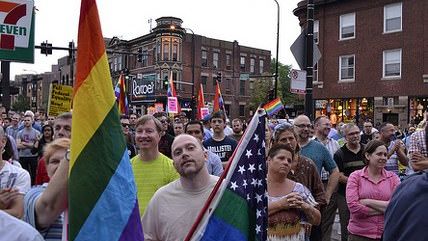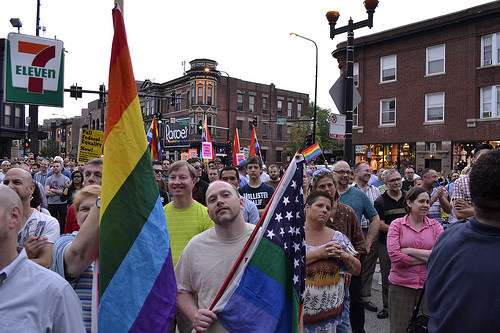How Concerned Should Ballot Initiative Lovers Be About the Prop. 8 Punt?
Does it give states coverage to simply ignore the people's wishes?


In a 5-4 split that put the Supreme Court justices together in an unexpected combination (Roberts, Scalia, Ginsberg, Breyer and Kagan against Kennedy, Thomas, Alito and Sotomayor), the court determined yesterday that the proponents of California's Proposition 8 did not have standing to defend the constitutionality of the amendment banning recognition of gay marriage.
It's an unusual case because California's governor and attorney general refused to defend the proposition once it was challenged. The state allowed the private proponents of Proposition 8 to defend it in court, but it was struck down by the U.S. District Court of Northern California, a decision that was upheld by the Ninth Circuit Court of Appeals.
Here's how SCOTUSblog summarized the Hollingsworth v. Perry decision:
The challenge to the constitutionality of California's Proposition 8, which bans same-sex marriage: After the two same-sex couples filed their challenge to Proposition 8 in federal court in California, the California government officials who would normally have defended the law in court, declined to do so. So the proponents of Proposition 8 stepped in to defend the law, and the California Supreme Court (in response to a request by the lower court) ruled that they could do so under state law. But today the Supreme Court held that the proponents do not have the legal right to defend the law in court. As a result, it held, the decision by the U.S. Court of Appeals for the Ninth Circuit, the intermediate appellate court, has no legal force, and it sent the case back to that court with instructions for it to dismiss the case.
In response to the ruling, I've read people worried this decision would make it easier for elected officials to shut down reforms caused by ballot initiatives simply by refusing to enforce or defend them and leaving proponents with no alternative. Justice Anthony Kennedy worried as much in his dissent:
The Court's reasoning does not take into account the fundamental principles or the practical dynamics of the initiative system in California, which uses this mechanism to control and to bypass public officials—the same officials who would not defend the initiative, an injury the Court now leaves unremedied. The Court's decision also has implications for the 26 other States that use an initiative or popular referendum system and which, like California, may choose to have initiative proponents stand in for the State when public officials decline to defend an initiative in litigation. …
"There is much irony in the Court's approach to justiciability in this case. A prime purpose of justiciability is to ensure vigorous advocacy, yet the Court insists upon litigation conducted by state officials whose preference is to lose the case. The doctrine is meant to ensure that courts are responsible and constrained in their power, but the Court's opinion today means that a single district court can make a decision with far-reaching effects that cannot be reviewed. And rather than honor the principle that justiciability exists to allow disputes of public policy to be resolved by the political process rather than the courts, here the Court refuses to allow a State's authorized representatives to defend the outcome of a democratic election."
So should we be worried? Could the reverse – voters approve gay marriage recognition only to have the state refuse to back it – happen? What if the voters approved term limits for state legislators and they just ignored it?
The majority decision was not unsympathetic to the argument (incidentally, it's interesting to see how polite these arguments are when you end up with such an unusual combination of justices on each side) but firm in that: 1) Getting a ballot initiative passed does not make you an agent of the state with standing; and 2) If you aren't an agent of the state who is expected to defend the law, then you have to have proof of a personal harm and the proponents do not. Arguably, if the situation were reversed (the state refusing to defend an initiative recognizing gay marriage), it's easy to see how they could allow standing and the outcry that would cause. A person denied a marriage license from a same-sex ballot initiative may be able to prove harms from discriminatory policies and earn standing. But that's a fight for another day – The Supreme Court declined today to take up some additional gay marriage lawsuits for the next session.
You can decide for yourself how concerned you should be about the ballot initiative process by reading Hollingsworth v. Perry here (pdf).
